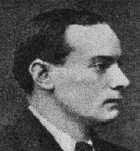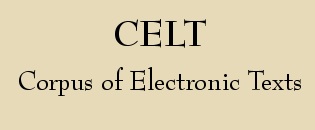 |
Patrick Pearse, also known as Pádraig Pearse (Pádraig Mac Piarais)
|
| |
|
| 1879 : |
born Dublin to Irish mother and English father |
| 1893: |
began learning Irish |
| October 1896: |
joined Gaelic League which was only three years old, attended the
Central branch |
| 1896: |
became pupil-teacher at Christian Brothers School, Westland Row,
Dublin |
| June 1898: |
sat Matriculation examination of the Royal University; later that
year began private study for two years towards the B.A. degree (attended
University College Dublin for part of the third); also studied at
the same time at Trinity College Dublin for King's Inns |
| Summer 1898: |
co-opted to the Executive Committee of the Gaelic League; first
visit to Aran |
| 1899: |
taught a weekly class in Irish in the then Jesuit University College
Dublin; James Joyce was one of his pupils for a short time. Later
taught at Alexandra College, CBS Westland Row and was examiner in
Irish history at Clongowes College |
| September 1900: |
father died, Pearse and his brother Willie left the thriving stone-carving
business which was renamed Pearse & Sons |
| June 1901: |
took final exams at the Royal University and at King's Inns; awarded
2nd class B.A. in modern languages (Irish, English, French) and B.L.;
called to the Bar
March 1903: became editor of An Claidheamh Soluis (journal
of the Gaelic League): held this position until late in 1909 |
| 1905: |
took his only case as barrister, acted for the Gaelic League; Poll
an Piobaire (The Piper's Cave) published |
| 1905 June: |
visited Belgium to examine the continental system of education in
a bilingual country; this visit formed the basis of nearly fifty articles
and editorials |
| 1906: |
writing as Colm Ó Conaire published prose poems |
| 1907: |
Íosagán agus Sgéalta Eile (Little Jesus and other Stories)
published |
| 1908 September: |
opened school St Enda's (Scoil Éanna) at Cullenswood House,
Rathmines, Dublin; St Enda's finally closed in 1935 |
| 1909 December: |
poem 'A Mhic Bhig na gCleas' (Little Lad of the Tricks) written |
| 1910: |
Pearse & Sons dissolved; St Enda's moved to The Hermitage, Rathfarnham;
St Ita's school for girls founded. Got into debt due to over-expansion
of schools; supported, with his brother, their mother and two sisters |
| 1912: |
An Rí (The King) produced |
| 1913 November 11: |
Irish Volunteers' first meeting at which Pearse attended: a non-political
organization |
| 1913 December: |
swore the oath of the Irish Republican Brotherhood, infiltrated
the Irish Volunteers |
| 1914 February 8: |
left Ireland from Cóbh for America to raise funds for St
Enda's; returned in May |
| 1914: |
during the summer the Volunteers received arms from Erksine Childers'
yacht; Pearse stored some of these in St Enda's |
| 1914 December: |
appointed director of military organization in Volunteers |
| 1915 March 10: |
appointed commandant unattached to any battalion; involved in drilling
and exercising troops |
| 1915 August 1: |
gave oration at O'Donovan Rossa graveside in Glasnevin Cemetery,
Dublin |
| 1915 September: |
appointed to the eleven-man Supreme Council of the IRB |
| 1916 April: |
preparations became intense for rising on Easter Sunday; Pearse
issued "General Orders" for manoeuvres on 3 April |
| 1916 April 25 (Easter Monday): |
walked from Liberty Hall with James Connolly to the General Post
Office with soldiers; occupied GPO for five days; was one of seven
who signed the Proclamation of Independence |
| 1916 April 28: |
issued manifesto, signed as P.H. Pearse Commandant General, Commanding-in-Chief,
the Army of the Irish Republic and President of the Provisional Government |
| 1916 April 29 (Friday): |
unconditional surrender of GPO and Provisional forces to the British
Army; taken to Arbour Hill Barracks, moved to Richmond Barracks for
court-martial |
| 1916 May 3: |
killed by firing-squad 3.30 am, as was his brother Willie; both
buried in quick lime in Arbour Hill |

